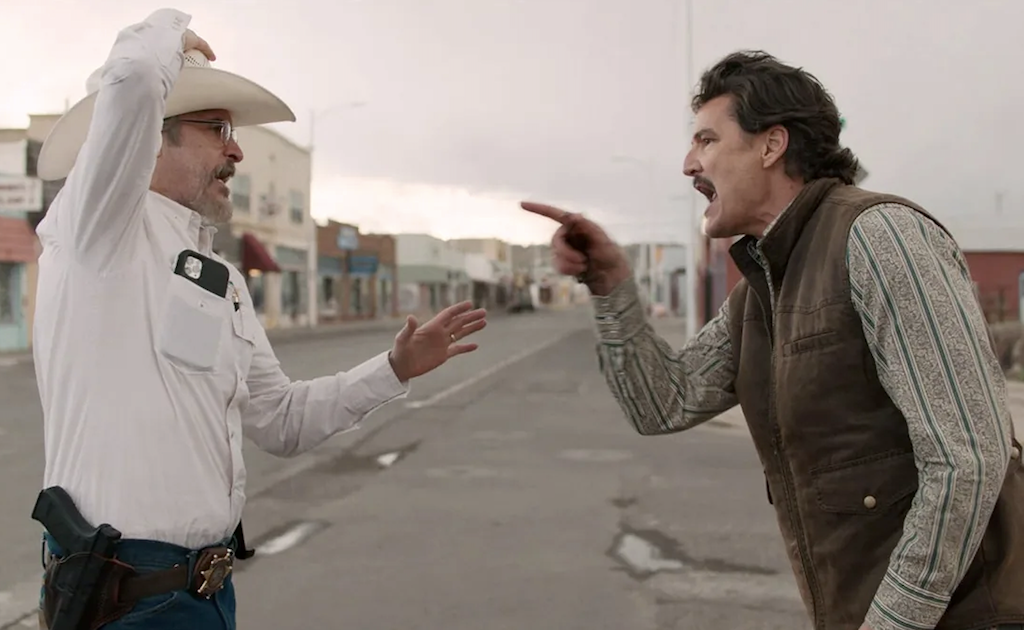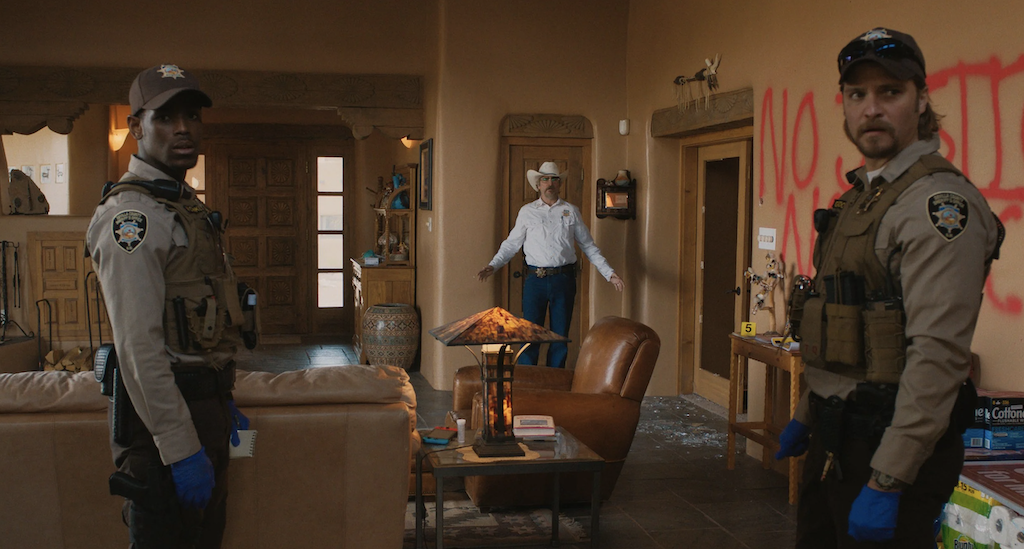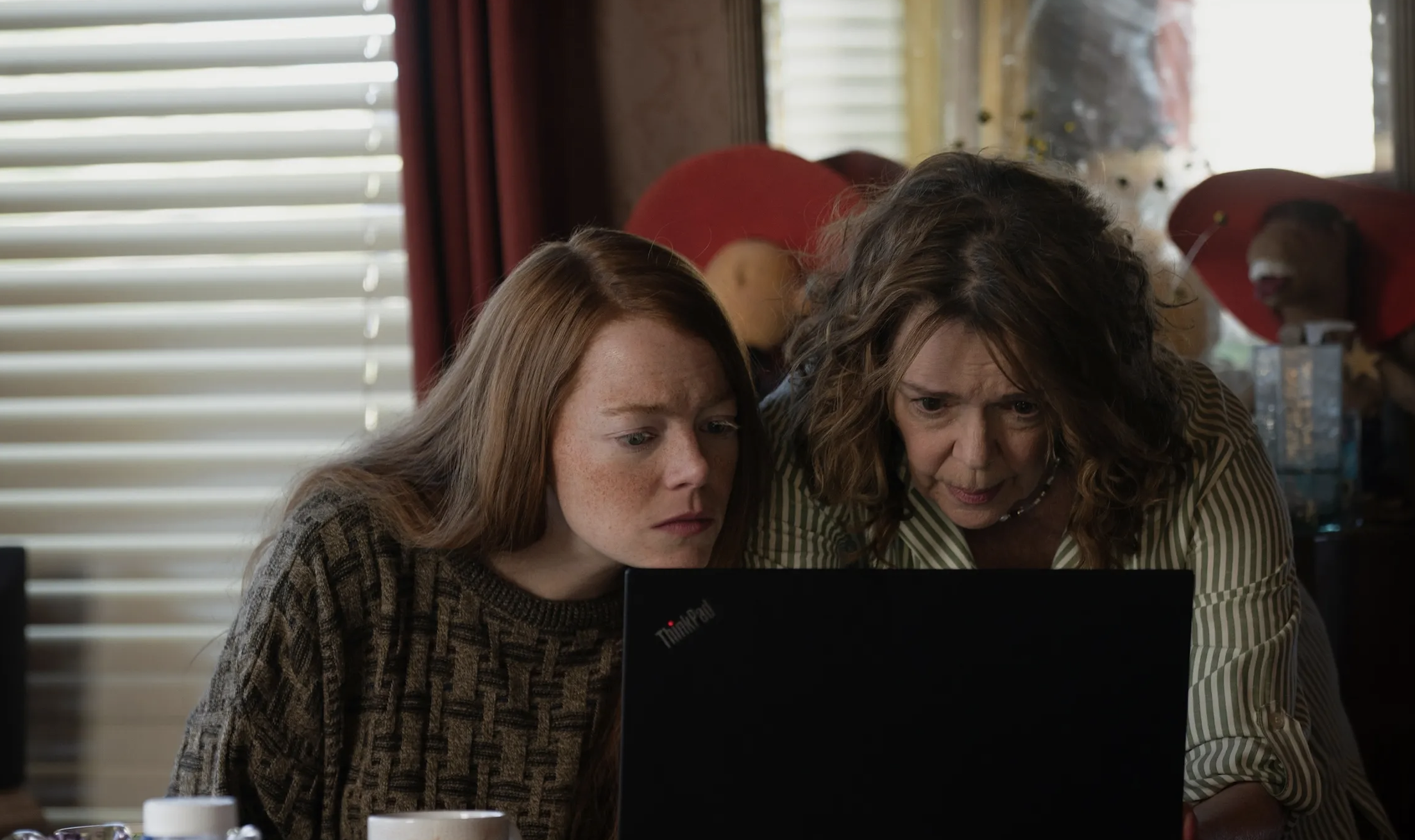Eddington Is a Tragic Masterpiece of the 2020s
Ari Aster’s new film, Eddington, pulls no punches against the Right or the Left. Yet its message is anything but moderate.

Joaquin Phoenix and Pedro Pascal in Eddington. (A24)
I did myself no favors by checking to see what critics are saying about Ari Aster’s new film, Eddington, a movie that could go down as something like our generation’s Network or even Dr. Strangelove. “Eddington is so solemnly goofy that its vision of polarized America might as well not be a satire,” says Armond White of the National Review. On the other side of the politico-literary spectrum, a critic from the New Yorker frets about how director Aster tries to “score points off mask-wearers, young progressives, anti-racists, and other targets beloved of reactionaries.”
Then there are those further on the Left who — after watching a movie where (spoiler alert) a small-town sheriff machine guns a cop’s leg off only to get stabbed in the skull by an Antifa supersoldier — complain that it’s dull. A quick round up of takes on Letterboxd and social media confirm that countless progressives are now griping about just how uninteresting the whole thing is — which is really just zillennial code for “we don’t want you to see this movie because it has a perspective that makes me uncomfortable.”
That’s unfortunate. Because Eddington is not only a great film but an uncompromising reflection of all the ways — funny, embarrassing, shameful, and horrifying — that America put the pedal to the metal on social breakdown in 2020. And it’s a message that anyone who purports to care about improving the social condition (i.e., socialists) needs to hear.
Why Eddington Unnerves
Eddington is a neo-Western about the breakdown of social order in a small town in New Mexico during the spring of 2020. The twin pathogens of COVID-19 and a proposed data center by a faceless AI company called “solidgoldmagikarp” have set the town’s denizens at each other’s throats before the movie even starts. Joaquin Phoenix, in one of his best performances, plays the local sheriff, Joe Cross, whose vaguely conservative, populist outlook clashes with the town of Eddington’s mayor, Ted Garcia (Pedro Pascal), who enforces mask mandates and wants to roll out the red carpet for solidgoldmagikarp’s data center. The sheriff then decides to mount his own campaign for mayor against Garcia.
To say that “mayhem ensues from there” is a vast understatement.
While the action between these two starts to heat up, Black Lives Matter protests, which broke out during lockdown, throw a wrench in their respective campaigns. Predictably, some critics are annoyed with the portrayal of these protesters — the first of many things that seems to bump them while watching Eddington. What we see in the film are a handful of screen-addicted teens (one with an Instagram handle containing the phrase “bernieorbust”) who seem more interested in scoring points with local girls than anything related to social justice. In other words, they behave like teens actually behave.
During the protests, Eddington‘s lone black cop, Michael (Michael Ward), is subject to a torrent of abuse by an almost entirely white group of #BLM protesters. They scream at him that he doesn’t understand whatever it is they have in mind when they decry “racism.” They can’t imagine that a black guy would even want to be a cop and accuse him of betraying “his people.”
Did this kind of thing happen in 2020? Of course. We all remember it. Does it make progressives look bad? Yes, it does. And it should. Not just because it’s ridiculous behavior but because the protesters in Eddington demonstrate that they are totally blind to the ways race and racism actually function in the context of the town’s political and economic life.
Upon being promoted, Michael asks Sheriff Cross whether he was made lieutenant because of the “news” (meaning, George Floyd). Right then, you can tell: Michael is perfectly aware of how race gets mobilized cynically by all sides. Wistfully, he says that his dad, despite having a long career on the force serving alongside Sheriff Cross, never made captain. It doesn’t take a genius to figure out that Michael’s father was likely kept from his promotion for the exact same reasons Michael suspects that he is now being promoted.

That seemingly perpetual cycle of racecraft is what Aster zeroes in on. He wants us to see exactly how anti-racism functions to divert our attention from the real drivers of social inequality in much the same way racism does.
As the focus on race consumes Eddington, a jealous white deputy (Luke Grimes) suddenly starts to see race everywhere. What before was a natural bro-y work relationship becomes fraught as Michael is suspected of being in league with some nefarious black movement (as his coworker calls it “Blacks Lives Matter”) that flashes across television screens and social feeds. Meanwhile Michael just wants to shoot guns in the desert and gamble on crypto. He’s no paragon of virtue but why should he be? He’s a young man in a small town in America — of course he likes guns and crypto.
In a similar fashion, Aster shows how easy it is to develop totally wrongheaded understandings of the needs of any group once race — instead of, say, their job — becomes their defining characteristic. In the film, we see the underfunded tribal police from a neighboring Pueblo reservation complain that they never get help from Eddington’s (equally tiny) police force. This is a very real gripe, one that has to do with how dysfunctional municipal government and local policing has become.
Just this month the Wall Street Journal lamented: “The Rapid Rise of Killings by Police in Rural America.” And what is the source of that rise? The long slow depletion of resources: “Lower salaries hinder sheriffs’ ability to attract experienced and qualified candidates.” Worse, as rural America more and more experiences the kinds of crises long common to urban precincts — drugs, mental health crises, endemic poverty — deputies are placed in ever-tougher situations with less support than before.
The Wall Street Journal piece makes it clear: low pay, bad training, no supervision, and a lone-deputy system have led to surging police violence in America’s rural counties, something Eddington puts front and center. Yet is anyone in the film interested in tackling the challenge? No. Instead, protesters spend their time screaming about “stolen land” as if this provides some solution to the Pueblo’s cash-strapped services. Meanwhile, Sheriff Cross finds it annoying that the Pueblo officers keep badgering them to coordinate more, even as it’s clear that his own deputies have been dropping like flies thanks to a combination of fentanyl and reckless behavior. His ludicrous commitment to a lone-ranger model means everyone suffers.
Eddington offers a strong rebuke of that supposed rugged individualism, embodied by the affable but dim-witted Sheriff Cross. Aster’s other conservative characters have all the vices common to their political tribe. A palpable sense of grievance, a quickness to judge, and a deep hypocrisy between the ways they live their lives and the world they profess they desire.
Cross claims he can’t wear his mask because of his asthma, not realizing just what COVID does to a person’s lungs. Moreover, the movie offers a searing indictment of our uniquely American obsession with guns. As a friend of mine remarked, it’s rare that a movie as violent as this one can make a person so afraid of firearms. Yet it does.
The guns in Eddington are terrifying. There was an audible gasp in the theater when the shooter of a sniper rifle was finally revealed. A reminder of how easily someone can go from righteously aggrieved to murderer in a country so awash with firearms and ammunition — and remember: 2020 featured one of the highest spikes in gun purchases in American history. Certainly, it was no small contribution to the historic murder wave that crested around the same time.
Eddington’s Tech-Induced Social Psychosis
Whatever is happening to Eddington, it’s not happening because anyone wants it to happen. It’s that total loss of control, that loss of democratic sovereignty, over our political and economic lives that informs the slow and steady loss of psychic control that Eddington‘s characters experience. The psychosis isn’t simply induced from too much doomscrolling or isolation. It’s that there is no alternative to doomscrolling and isolation.
The movie opens with liberal Mayor Garcia fighting to get a massive AI data center built on the outskirts of Eddington. And, of course, he is doing this not because he’s an evil Silicon Valley pawn but because small towns need investment. Badly. What Eddington shows is just how helpless these locales are against forces so much larger than themselves, and how helpless we are against the crazy-making machines they’ve convinced us to carry in our pockets.
Not only is the fictional company solidgoldmagikarp able to effectively colonize Eddington (literally stealing native land) without so much as a smidge of resistance but it does so entirely behind the backs — and over the heads — of the main protagonists, right and left. Nothing can stop the coming AI revolution, everyone knows that. Everyone thoughtlessly gets on board.
It’s why Aster gives the mayoral campaign the not-so-subtle double-entendre slogan “Your Being Manipulated.” Yes, Cross can’t differentiate between you’re and your. But the result is more thoughtful — your being, manipulated. Your mind, yourself, completely mangled by overexposure to the endless reels, the intentionally outrageous algorithms, and the hyperreality that is our digitized social world.
Each character in Eddington, through constant interaction with the social media feedback loop, becomes a caricature of themselves. A liberal leader who seems thoughtful, if slightly patronizing, becomes overbearing, elitist, and scornful. A sheriff who seems affable, if slightly incompetent, becomes a ruthless, rageful murderer. Unfounded accusations ratchet up and out of control. Everyone becomes the very thing their online enemy swears they really are.
The Thin Line Between “Outlandish” and “the Real World of the 2020s”
And that gets to what makes Eddington such an uncomfortable experience for so many — the elements that seem most far out, most difficult to make sense of, all have a kernel of truth. “Your pain is not a coincidence. We are not a coincidence,” says Austin Butler’s character, Vernon Jefferson Peak, a charismatic YouTube influencer. Vernon believes that he was abducted and molested by some powerful figure or figures but managed to escape his captors and now spends his time trying to expose an elite cabal of pedophiles. He eventually seduces Cross’s troubled wife, Louise, played brilliantly by Emma Stone. And she takes off with him.

But is she really that crazy to believe such an insane story? Just this week, news about Ghislaine Maxwell possibly getting pardoned by no less than the White House provides plenty of reason to suspect that something is amiss. Another bit deemed beyond parody is that sophisticated Antifa-aligned terrorists would be flown into a little town via private jet. The scene got belly laughs in my theater. Partly because it seems to be making fun of the oft-repeated rightist paranoia that George Soros ships in paid agents of chaos whenever there is a protest, even to tiny towns like Eddington. But it’s also clear that Aster is aware that our reality is getting ever-stranger by the day. In Eddington, the viewer isn’t totally sure whether the Antifa supersoldiers are paid for by SolidGoldMagikarp, some government agency, or simply a figment of Cross’s coronavirus-infected imagination. But in the end, it certainly all seems real. It did happen. In an age of thin social ties — and social media–induced psychotic fantasy — fever dreams can easily become reality.
That brings us to the tech company’s very name. It turns out “solidgoldmagikarp” is a reference to an actual AI phenomenon. A couple years ago, ChatGPT users discovered that if they asked the AI to repeat the phrase “solidgoldmagikarp,” it caused the chatbot to fritz out, unable to make sense of the command. Why? Because for years, a Reddit user named “solidgoldmagikarp” would log on to the subreddit r/Counting and simply post ascending numbers. So every instance of that phrase was linked to a string of numbers in order. Because these stupid chatbots can’t reason, the machine just spits out something unintelligible. The error has since become a meme. And by becoming a meme, the chatbot can only now make sense of the thing. Digital hallucinations, which are not real in any sense, become real by virtue of people talking about them enough.
If none of this makes any sense, that’s kind of the point. When we first meet her, Cross’s mother-in-law, played by Deirdre O’Connell, babbles totally incoherent conspiracy theories. By the end of the film, she’s babbling totally incoherent politico-speak at the solidgoldmagikarp data center ribbon-cutting: railing against the leftist cabal in government while celebrating new renewable energy; complaining of the panopticon while praising a tech giant whose aim is nothing but datamining. The movie opens as it ends, with crazy people muttering crazy things.
In other words, Eddington has everything. It’s a remarkably complete portrait of America during a period of social and political breakdown. It hits so close to home that it’s — at times — difficult to watch. Right down to the personal aspirations of ordinary people and how the society, arrayed as it is, frustrates the realization of those aspirations. What does Sheriff Cross ultimately want? We learn in his very first scene: not to be mayor, but to be a father.
Cross’s descent into hell begins with a simple, and reasonable, desire. A desire for some sense of rootedness and meaning. A desire that eludes him to the tragic end. And one that so many young people have found elusive. Instead, he gets glory, fame, and the attention that all internet-addled would-be influencer superstars crave — a fate that renders him enfeebled, crippled, and semi-comatose.
While Eddington skewers both the Right and the Left, socialists shouldn’t take offense — not if they have their priorities straight (after all, the ultimate villain of Eddington is a giant tech company). Besides, the aim of socialism isn’t “to grab a win for the Left,” whatever that is. It’s much more ambitious than that — we’re aiming for a victory for humanity itself. For society to assert itself against the compulsions of anti-social, market-driven forces. For our pursuit of the collective good to triumph over the immediacy of our personal vanities. And that’s something Eddington has a lot to say about.